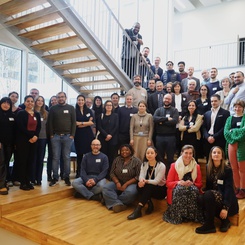With ESSEC Knowledge Editor-in-chief
‘The eyes of the world are on this race’. Paris Olympics’ triathlon hangs in the balance over E. Coli levels in the Seine
-CNN, June 18th, 2024
2024 Paris Olympics Could Be Deadly For Athletes, New Report Shows
-Forbes, June 18th, 2024
Will the Paris Olympics be a terrorist target? These three factors could be key
-The Conversation, June 25th, 2024
These recent headlines, from international media outlets, are just three among dozens in the lead-up to the Paris 2024 Olympic & Paralympic Games that highlight the various potential risks facing the Games: an unsafe Seine, extreme heat levels, terrorism…
This means that all involved need to take the necessary measures to prepare: the IOC, the athlete delegations, the host country, the police - and the hospitals, who need to be prepared for any number of extreme events. Marie-Léandre Gomez (professor), Marie Kerveillant (research engineer and assistant academic director of the ESSEC Executive Master’s in Management et Gestion des Organisations), Philippe Lorino (professor emeritus), Dr. Matthieu Langlois (MD, researcher and lecturer) all at ESSEC Business School, alongside partners at APHP Paris Santé Sorbonne-Université (team led by Professor Mathieu Raux), and the ENS Geopolitics of Risk Chair (Peter Burgess and Jan Verlin as heads), are exploring hospital preparations in their ongoing research project.
This project, called COMEXT (COordination of MEdical and non-medical teams in EXTreme contexts), explores how medical and non-medical teams coordinate in extreme settings, such as crises in hospitals and terror attacks. In 2021, they received funding from the Agence nationale de la recherche (the French National Research Agency), for a three-year period. By combining research expertise from management, philosophy, geopolitics and sociology, as well as from medical professionals, the project uses a holistic approach and blends different perspectives.
Why focus on hospitals? There’s been an increase in crises - and their severity and complexity are also increasing1.
Their research looks at two key axes:
-
The coordination between first responders and second responders
-
First responders include security teams, the RAID medical team (RAID stands for research, assistance, intervention, dissuasion, and is the police SWAT force unit that deals with the most dangerous situations), fire brigades, emergency medical assistance units
-
Second responders include the emergency department at hospital, and medical teams after patient intake
-
-
Hospital crises, with a focus on the key role of medical directors in times of crisis. Hospitals are involved in both internal and external crises:
-
Internal crises, to their structures and infrastructure (flooding, cyber attacks, power cuts) and human safety (armed intruders, fires)
-
External crises, like accidents and attacks outside the hospital, provoking a massive inflow of wounded persons, situations where coordination with first responder teams is necessary
-
The aim of the project is to better assess the level of complexity in crises faced by hospitals, to produce knowledge on their organization, and to contribute to helping hospitals in improving their crisis organization and coordination.
The Olympics: a unique set of circumstances
As evoked by the many headlines floating around, the Paris 2024 Olympic & Paralympic Games face potential crises, including heat waves and the ensuing risk for athlete and spectator health, bus accidents, and terrorist attacks. Hospitals are preparing to welcome a larger number of patients. Many doctors, nurses and employees have postponed their holidays to work this summer. Moreover, like many other sensible organizations, hospitals are also aware that they are at risk with cyber-attacks during the Olympics & Paralympics Games. All hospitals in the Paris area and in all cities welcoming the Games have been working for months on crisis preparation:
-
Coordination between the various hospitals and sites, notably in case of extreme crisis..
-
Updating or creating crisis plans, assigning responsibilities in the organizations, anticipating specific event features, such as people speaking languages other than French in large numbers flocking to Paris. All the hospitals have also organized large training exercises, involving first responders, emergency departments, surgery rooms, doctors, nurses, logistics, pharmacy, supply, communication… all employees have a role to play in crises. These exercises involve hundreds of people, and necessitate huge efforts to be organized without being detrimental to regular patients coming to hospital that day.
These exercises are not just to rehearse and implement crisis plans. They help hospitals to identify pain points and correct them. Scenarios are built to raise awareness of how people’s stress and emotions impact how they react in these tense situations.
The COMEXT research group is investigating various facets of crisis preparation through interviews with doctors and hospital directors and observing training and crisis exercises.. Data collection for the Olympics is still under process, but the researchers have shared some initial findings.
-
The Olympics & Paralympics Games are a wonderful opportunity to further develop hospital crisis preparation, and to develop agility and resilience. Historically, hospitals have had minimal interest in crisis preparation and organization. That being said, the 2015 Paris terrorist attacks were key in encouraging some doctors to improve hospital preparedness. Notably, the head doctor of RAID, Dr. Langlois, and doctors from La Pitié-Salpêtrière (notably Professor Raux) worked on their collaboration to better prepare for massive inflows of patients and developed executive education programs for doctors. Later, in 2019, the position of Crisis Medical Director was created to better organize the medical response to crises. The COVID-19 pandemic further demonstrated the need to better coordinate and organize. However, facing a critical lack of resources, hospitals found it difficult to maintain their efforts after the COVID-19 crisis. The 2024 games have again made crisis preparation a priority, with hospitals developing educational programs and simulation exercises in response. Both doctors and hospital managers acknowledge that preparing for possible crises during the Olympics is helping them to enhance their coordination, their ability to better anticipate, and their capacity to be more agile when facing uncertain and complex situations.
-
The preliminary findings also reveal a gender balance in medical crisis leadership. In the survey, half of the medical crisis directors are women, whereas there are overall fewer female heads of medical departments than male heads. In this regard, hospitals seem much more gender-balanced than most sectors. The COMEXT researchers are exploring various hypotheses to explain this finding. The most optimistic hypothesis is that crisis management is an opportunity for female doctors to empower themselves in managerial positions. The pessimistic one is that crisis management does not seem so interesting and rewarding for male doctors, who let it fall to their female colleagues. Further research could shed more light on the drivers of this phenomenon.
-
The conceptualization of crisis time: the COVID-19 pandemic and now the preparation for the Olympic Games show that we need to revisit the view of crisis as a specific moment, an episode that we can differentiate from ‘normal’ times. There is less and less discontinuity between crisis and non-crisis times, and the traditional trio of preparation- crisis situation - debriefing/post crisis. COMEXT proposes to revisit crisis time with a more continuous, processual view. It is particularly important for the future of crises such as the climate crisis. For hospitals, it may be encouraged to revisit crisis governance, with a more fluid crisis organization. Currently, the crisis medical director is officially appointed and active only during crisis times, which limits preparations. Moreover, coordination between hospitals, as well as between hospitals and the rest of the healthcare and rescue system, is to be rethought. This is part of the ambition of future research and propositions for the COMEXT group.
Reference
Lagadec, P. (2023). Sociétés déboussolées : Ouvrir de nouvelles routes. Paris : Editions Persée.
Further readings:
Gomez, M. L., Kerveillant, M., Langlois, M., Lot, N., & Raux, M. (2023). Organizational innovation under constraints: The case of covid patients’ flow management in Parisian hospitals. Health Services Management Research, 36(2), 137-144.
Langlois, M., Autissier, D., Gantzer, G., Gomez, M. L., & Kerveillant, M. (2024). Incertitude ordinaire: résilience organisationnelle en situation de crise. Éditions EMS.









